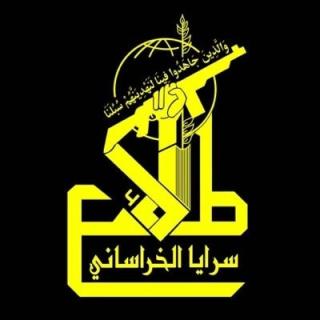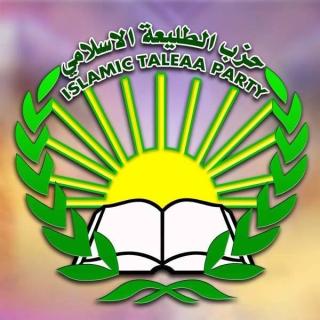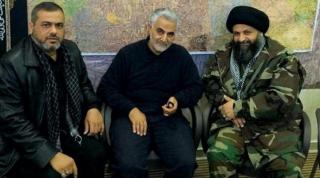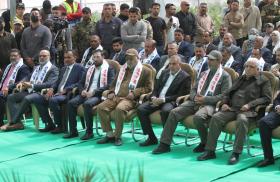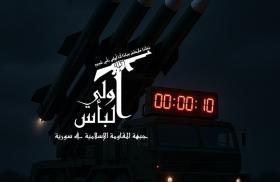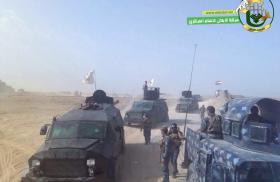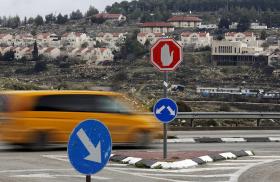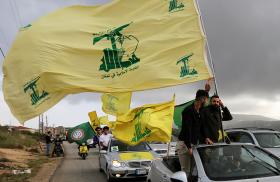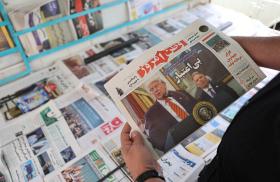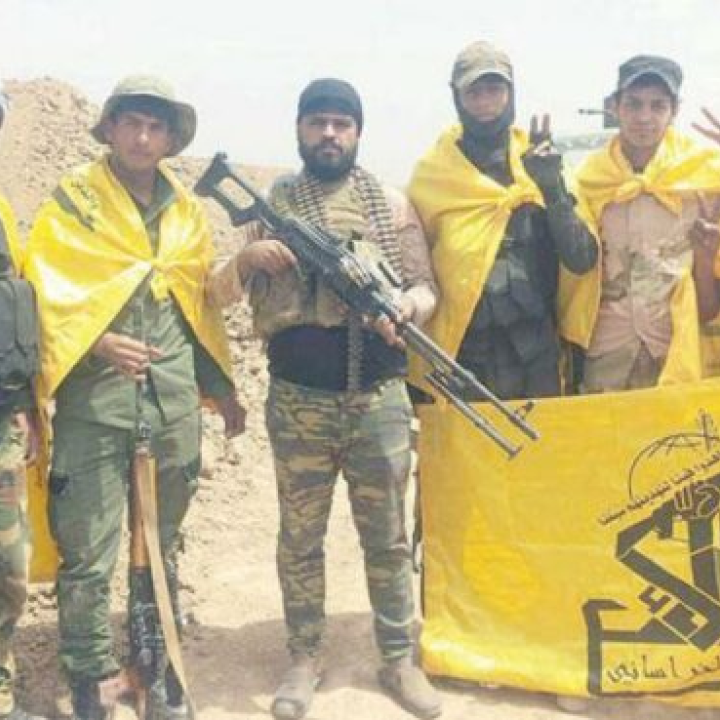
Profile: Saraya Talia al-Khurasani

Part of a series: Militia Spotlight: Profiles
or see Part 1: How to Use Militia Spotlight: Profiles
A longstanding partner to Iran's Qods Force and Lebanese Hezbollah, this militia is one of Iraq's most notorious in terms of human rights abuses and rampant criminality.
Name: Saraya Talia al-Khurasani (Khorasani Vanguard Companies, or STK). Named after Abu Muslim al-Khorasani, a medieval Persian general who led the Abbasid Revolution that toppled the Umayyad Caliphate, leading to the establishment of the Abbasid Caliphate.
Type of movement: Armed group (fasail) and political/social organization. Focuses on social and economic operations but has also extensively facilitated kinetic military operations against U.S. forces in Iraq and Syria. Has undertaken domestic counter-political/social moderate operations and threatened to carry out counter-Israel operations. Has targeted human rights and freedom of expression among Iraqis.
History:
- Originally established in 1986 as the anti-Saddam resistance group “al-Karrar Brigade,” the militia was led by Yassin al-Musawi under the aegis of Muhammad Baqir al-Hakim, the late Iraqi Shia theologian who led the Iran-formed Supreme Council for Islamic Revolution in Iraq. With backing from Iran's Islamic Revolutionary Guard Corps-Qods Force (IRGC-QF), the group opposed the Baathist regime and engaged in guerrilla warfare within the southern marshes, especially in the Chibayish and al-Nasiriyah marshes in Dhi Qar and Basra. The group was evicted into Iran (and reportedly to parts of the Najaf and Karbala deserts) after the draining of Iraq’s marshes, then rebranded in 1995 as the “Islamic Vanguard Party" (Hezb al-Talia al-Islamiyah).
- In 2004, the Islamic Vanguard Party submitted its credentials to the new Iraqi parliament as an official political party and participated in the first post-Saddam parliamentary election in January 2005 under the name "Ahbab Nasrallah."
- In 2013, the party established its official organized militia, Saraya Talia al-Khorasani, with extensive IRGC-QF help and under the leadership of Hamid Taqavi, an Iranian-Arab brigadier-general in the IRGC known as "Abu Miriam." At the time of its establishment, STK claimed to have around 3,000 personnel, though the actual total was likely much lower.
- In fall 2013, STK forces began deploying to Syria to join other Iraqi Shia militias in assisting the Assad regime and protecting Shia shrines in Damascus, particularly the Sayyeda Zainab Shrine. In August 2013, STK was reportedly involved in massacres against Syrian civilians in the Damascus countryside.
- After the Islamic State (IS) seized Mosul, STK was one of the factions that exploited Ayatollah Ali al-Sistani’s defensive fatwa to form a unit in Iraq's Popular Mobilization Forces, becoming the PMF's 18th Brigade. Underlining its strong IRGC-QF support, STK was able to register almost 100 percent of its 3,200 Iraqi government-paid billets immediately in 2014-15, while many other PMF units could only get part of their manpower registered.
- STK took part in counter-IS battles in Jurf al-Sakhar, other "Baghdad Belts," Diyala, and Tikrit. An IS sniper killed Hamid Taqavi in Samarra in September 2014, resulting in two Iraqis—Ali al-Yasiri and Hamid al-Jazaeri—taking over leadership of the organization. In 2015, Human Rights Watch published listing STK’s humanitarian violations in Iraq and its Syria-based crimes. In Iraq, STK was viewed even within the PMF as a particularly problematic and criminally focused unit.
- In 2019-20, STK and its leaders led the mass killing of unarmed Iraqi protesters. Afterward, the group lowered its profile in Iraq and seemed to focus its visible activities in Syria. On-the-ground tactical leadership in Baghdad was provided by Jazaeri, while Yasiri held down protests in southern Baghdad.
Chain of command:
- Ali al-Yasiri: The group’s secretary-general, an Iran-backed anti-Saddam guerrilla fighter and a "walai" loyalist of Iranian Supreme Leader Ali Khamenei. He models his leadership after Hamid Taghavi, whom he described as having a “magical” effect on people. Yasiri was briefly arrested in December 2020 along with Hamid al-Jazaeri after STK fighters killed protesters in Iraq.
- Hamid al-Jazaeri: One of the founders of STK, Jazaeri is also an Iran-backed anti-Saddam guerrilla fighter. He played a prominent, often publicly broadcast role in suppressing the 2019-20 protests in Iraq. The government briefly arrested him for leading military units without prior approval from the Joint Operations Command. The PMF Security Directorate also disciplined him for acting without obtaining official approvals.
- IRGC-QF: Within Syria, STK has been funded and equipped by Iran since 2013, receiving both financial support and medium to heavy weaponry.
- Lebanese Hezbollah: According to Hisham al-Hashemi, the Iraqi paramilitary expert murdered by militias in June 2021, Yasiri models his leadership style on Hezbollah commander Hassan Nasrallah. Notably, the movement’s first post-2003 branch in Iraq was dedicated in Nasrallah’s name (Ahbab Nasrallah). Yasiri has frequently met with Hezbollah leaders in Syria, usually in al-Hujaira, al-Baramkeh, al-Muhajireen, and Sayyeda Zainab in Damascus. Cooperation between STK and Hezbollah is especially strong now in Qamishli, where the latter pays STK fighters directly.
Affiliate relationships:
- PMF militias in Iraq: Since 2019, STK has operated along the Iraq-Syria border between the Walid crossing and al-Qaim district, a crucial area along the Baghdad-Damascus highway. There, it works closely with Ansar Allah al-Awfiya (19th PMF Brigade) and Liwa al-Tafuf (13th Brigade). STK also reportedly shared a training camp with Liwa al-Tafuf as recently as 2019. STK leaders have attended meetings of anti-U.S. militants in Iraq convened by Shibl al-Zaydi, the U.S-designated leader of Kataib al-Imam Ali (40th Brigade).
- PMF militias in Syria: In Syria, STK has operated alongside U.S.-designated terrorist groups Kataib Hezbollah (which runs the 45th, 46th, and 47th PMF Brigades), Kataib Sayyid al-Shuhada (14th Brigade), and Harakat Hezbollah al-Nujaba (12th Brigade), plus the non-designated group Kataib Jund al-Imam (6th Brigade).
- Syria’s National Defense Forces (NDF): The NDF have become deeply intertwined with STK throughout Syria, particularly in the east. In Hasaka governorate, the IRGC and Lebanese Hezbollah have strategically deployed STK forces, leveraging local NDF leaders such as Abdul Qader Hammou and Bassam al-Arsan to expand its influence.
Subordinate relationships:
- STK controls two training camps in Karbala and Anbar, Iraq. The latter was named the "Sheikh Hajj Hamid Taqavi Training Center" after Hamid Taqavi.
- STK has established a headquarters within Hasaka’s security square in Qamishli, Syria.
- STK’s social media presence is small, with no prominent dedicated accounts. In addition to its small official Facebook group, another very small Facebook group has been created with the name “STK South Office.” The group also has two official but inactive Telegram channels with practically no followers.
- Famous Iraqi singer-songwriter Mahdi al-Aboudi occasionally produces pro-STK songs that promote the militia’s narrative. STK is sometimes praised by the Nour al-Wilaya Foundation and al-Taliah satellite channel.


